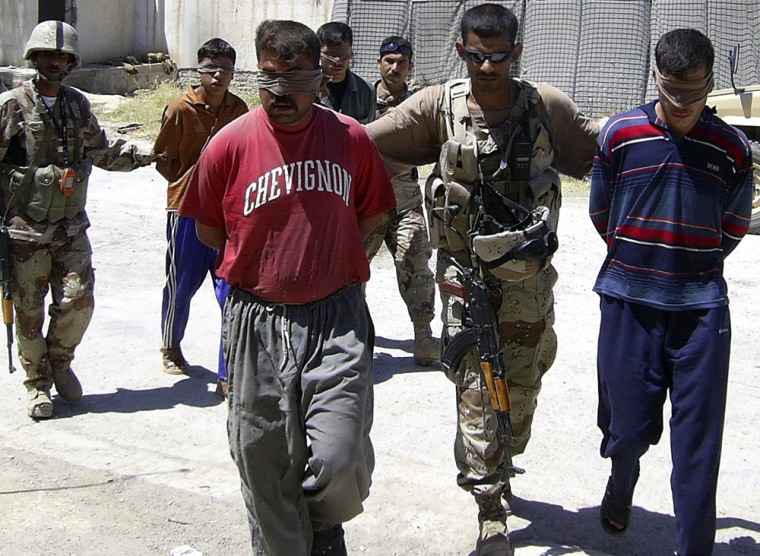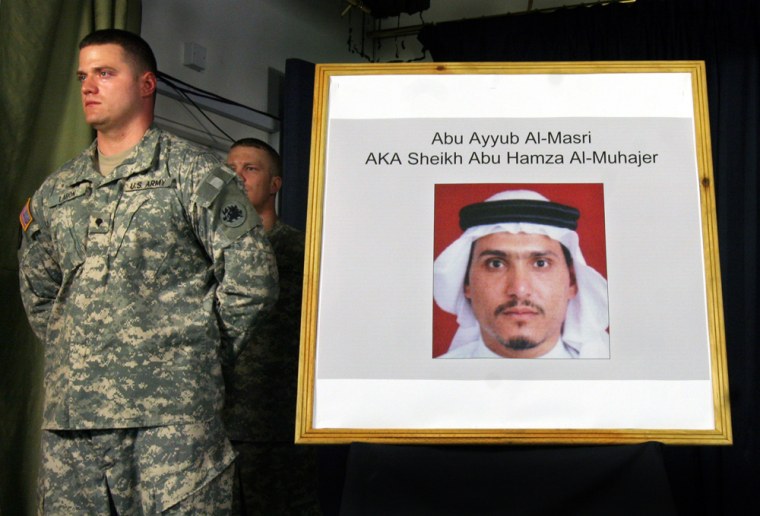The U.S. military said Thursday that it believes the real name of Abu Hamza al-Muhajir, named as al-Qaida in Iraq's new leader, is Abu Ayyub al-Masri.
Also, NBC News reported Thursday that U.S. intelligence officials have determined that Abu Musab al-Zarqawi was in the remote safehouse where the terrorist organization's leader was killed by U.S. bombs for as long as a week before the June 7 attack. Officials say intelligence indicates the site was al-Qaida in Iraq’s primary base.
A spokesman said again Thursday, however, that the U.S. military had no specific information that al-Zarqawi was in the safehouse when a U.S. F-16 attacked with two 500-pound bombs.
Al-Qaida named Muhajir the successor to al-Zarqawi, who was killed in the airstrike.
"We think that Abu Ayyub al-Masri is in fact, probably, Abu Hamza al-Muhajir. They are probably one and the same," Maj. Gen. William Caldwell, the spokesman for the U.S. military in Iraq, told a news conference.
U.S. and Iraqi forces have carried out 452 raids since al-Zarqawi's death, and 104 insurgents were killed during those actions, Caldwell said.

He said 255 of the raids were joint operations, while 143 were carried out by Iraqi forces alone. The raids also resulted in the captures of 759 “anti-Iraqi elements.”
Al-Qaida in Iraq’s base
NBC News’ Jim Miklaszewski reports that military officials say the intelligence seized at the site of al-Zarqawi’s death indicates it was a primary base of operations for al-Zarqawi and al-Qaida in Iraq.
According to one official the telephone intercepts that helped keep track of the activities of al-Zarqawi’s spiritual adviser were not random, but the result of human intelligence. The official said an al-Qaida informant provided the U.S. military with precise information on the specific cell phones that were in use.
The official could not say, however, whether the U.S. actually intercepted a call between al-Zarqawi and his adviser, Sheik Abdul Rahman. Rahman was also killed in the raid.
'Huge treasure'
Earlier Thursday, Iraq's national security adviser said that a "huge treasure" of documents and computer records seized after the raid on al-Zarqawi's hideout has given the Iraqi government the upper hand in its fight against al-Qaida in Iraq.
Iraqi National Security Adviser Mouwafak al-Rubaie also estimated that a large number of U.S.-led forces will leave Iraq by the end of this year, and a majority will be gone by the end of next year. "And maybe the last soldier will leave Iraq by mid-2008," he said.
Al-Rubaie said a laptop, flash drive and other documents were found in the debris after the airstrike.
More information has been uncovered in raids of other insurgent hideouts since then.
Al-Rubaie called the find a "huge treasure ... a huge amount of information."
'The beginning of the end'?
When asked how he could be sure the information was authentic, al-Rubaie said, "There is nothing more authentic than finding a thumbdrive in his pocket."
"We believe that this is the beginning of the end of al-Qaida in Iraq," al-Rubaie said, adding that the documents showed al-Qaida is in "pretty bad shape," politically and in terms of training, weapons and media.
"Now we have the upper hand," he said, speaking in English and Arabic at a news conference in Baghdad. "We feel that we know their locations, the names of their leaders, their whereabouts, their movements, through the documents we found during the last few days."
"They did not anticipate how powerful the Iraqi security forces are and how the government is on the attack now," al-Rubaie said, expressing optimism that the government would be able "to destroy al-Qaida and to finish this terrorist organization in Iraq."
He said the documents, which he promised to release gradually after investigations were finished, would reveal details about the inner workings of the terror group and show how "al-Qaida is using everyone as a pawn to play in this war game, in this game of killing Iraqi people and destroying this country."
They "will show how their central strategy is to divide and destroy," he said.
